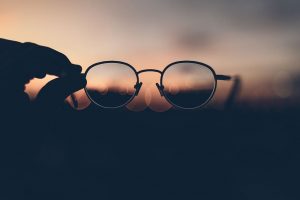The Fellows Journal is a forum for the current Library Publishing Coalition fellows to share their experiences and raise topics for discussion within the community. Learn more about the Fellowship Program.

Where I’ve Come From
For the last couple of years, I’ve been plugging away on a project that began with my participation in KairosCamp, a digital publishing institute run by Cheryl Ball and staff for the journal Kairos. For the camp, I’d proposed the idea of creating a digital text that would challenge readers by forcing them to read, navigate, and perceive the writing in an unfamiliar way. The idea was to replicate a feeling that one may experience when being excluded from accessing a particular space—a level of discomfort that readers wouldn’t expect to have when browsing online.
As I designed my project, I found myself slipping into talk of simulations. As in, “this project will simulate the experience of [x] disability for [x] assistive device.” When I talked to web accessibility folks on my campus, they were excited about the possibilities of showing faculty how the structure of a webtext can limit or exclude people from reading and engaging with it. What I didn’t realize at the time was that there exists a whole literature about the problems with disability simulations, which can promote stereotypes about people with disabilities, inaccurately represent the full breadth of disabled experience, promote negative feelings about disability, and situate the “problem” of disability in particular people rather than in social and cultural barriers to inclusion (see French, 1992; Lalvani & Broderick, 2013; Nario-Redmond, Gospodinov, & Cobb, 2017; Olson, 2014). Not the territory I wanted to tread with my original project concept.
Personal Perspective
I was troubled when I began reading this literature about simulations, largely because I hadn’t been aware of it in the past. Partly, I thought that I should have been inherently cognizant of these issues because I also have a disability. I was born blind and, while I had surgeries that restored part of my vision, some was permanently lost. Recognizing faces is hard for me, as is navigation and a slew of tasks that I’m still identifying now as an adult. That said, I don’t use screen readers and my vision currently doesn’t substantially hamper my reading, unless distance is involved. Some of the key concerns in web accessibility aren’t automatically apparent to me because I fall somewhere between sighted and unsighted. Somehow I needed this reminder as my project evolved.
In a way, I’ve always felt that I should “inherently” understand both disabled and able-bodied experiences—as if I could understand and empathize with both by sheer force of will. And of course, the truth is, none of us will automatically understand the challenges others face despite having all the best intentions in the world.
Research Interests and a Call to the Community
It’s a simple anecdote but I’ve thought about this a lot lately as I start this fellowship with the Library Publishing Coalition. As I continue working with library publishing at my own institution, I am hoping to deepen my engagement with accessibility as well as intersecting experiences that I and others have too frequently overlooked. I’m a Scholarly Communication Librarian and yet haven’t put as much time as I’d like into considering how access extends to people who have perceptual differences in how they read and engage with information. These are issues that deserve renewed consideration even if we are in a profession that’s devoted to fantastic ideals like universal access. There are always assumptions, misunderstandings, and oversights still to explore.
Over the next two years, I hope to make these concerns a greater part of my focus professionally and share some of the things I find along the way. I’m looking forward to learning from others in the LPC community who have already thought deeply about these issues. In fact, if you have questions or research topics you’d like to see addressed related to accessibility and library publishing, please get in touch—talea.anderson@wsu.edu. I would love to hear your thoughts and ideas.
Thank you to the LPC community and leadership for welcoming me in and providing the opportunity to do this work—it’s a privilege I don’t take lightly, and I am grateful.
Photo Credit: Gray framed eyeglasses, CC0
